【BBC六分钟英语】你真的需要那么多的东西吗?
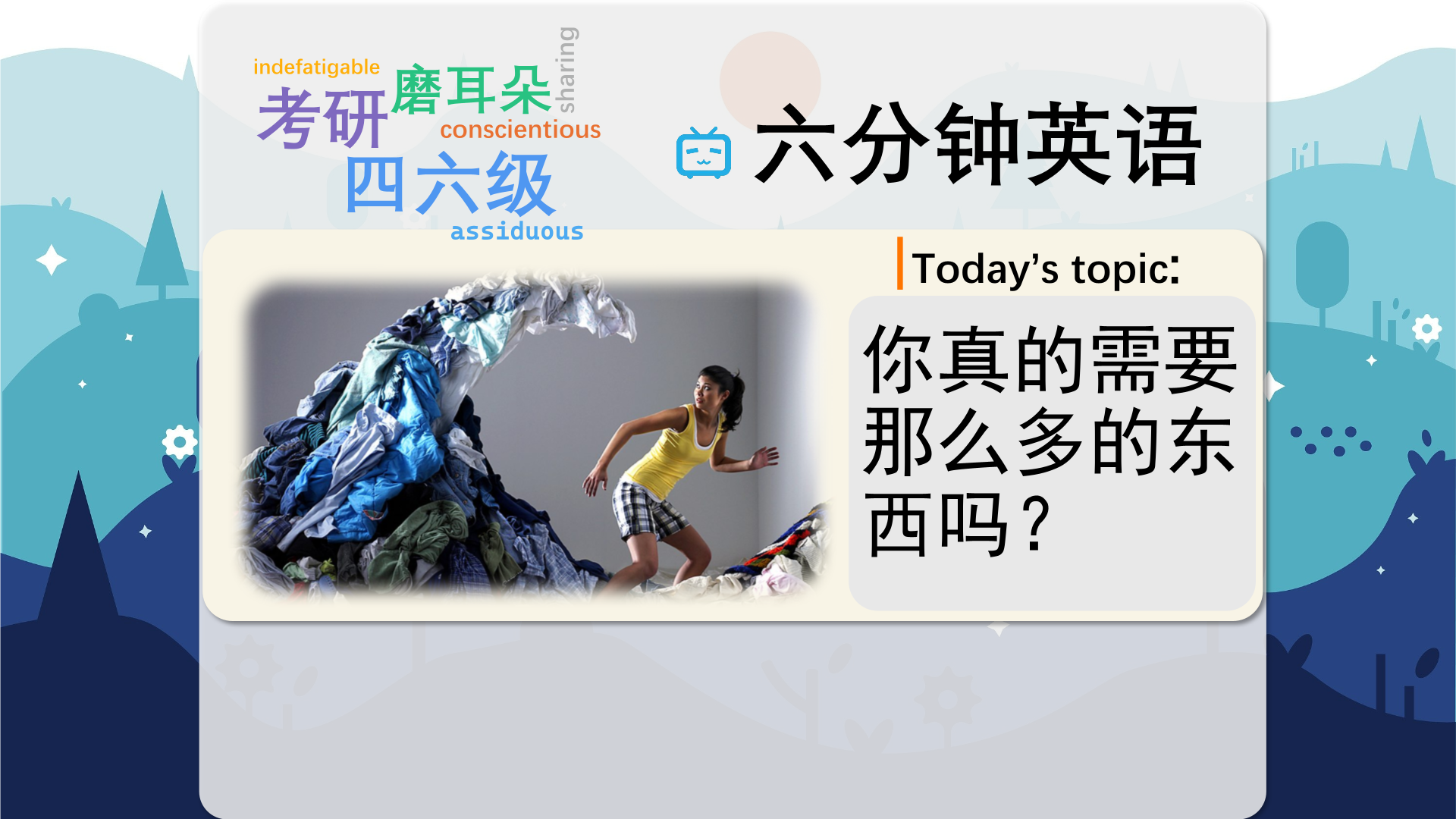
【英文脚本】
Alice
Hello and welcome to 6 Minute English. I’m Alice…
Rob
And I’m Rob. Now, Alice, what did you get up to at the weekend?
Alice
I did some spring-cleaning, which means cleaning a place very well, especially places you don’t clean often. So, I was tidying up my wardrobe, trying to organise things… and suddenly hundreds of shoes tumbled on my head!
Rob
Poor Alice! But why do you have so many shoes? And why do you keep them at the top of your wardrobe? I only have three pairs.
Alice
I like to match my shoes to my outfit, and three pairs wouldn’t do the trick. Well, the subject of today’s show is having too much stuff. And you’re making me feel guilty, Rob. You must have too much of something.
Rob
Yes, plastic bags. I think they’re useful, but they’re getting out of hand, and that means not under control. They’re taking over my kitchen!
Alice
You can recycle plastic bags, you know, Rob?
Rob
Well, you can recycle shoes too, you know, Alice!
Alice
Yes.
Rob
Now, usually I don’t have a lot of clutter in my flat, and that means an untidy collection of objects. Clutter makes it harder to find the things you need. And it makes moving house a nightmare! All those boxes full of things you don’t need…
Alice
Good point. I have a friend who suggested the three buckets system. You sort things into three different buckets: one you label as ‘to keep’, one as ‘to get rid of’, one as ‘maybe to get rid of’. Get rid of, by the way, means to remove something you don’t want. It’s the ‘maybe’ bucket that’s tricky, isn’t it?, You never know if you might need something in the future.
Rob
Yes, it would need to be a big bucket too.
Alice
Yes, it would.
Rob
Well, l think we could all live better with less. OK, well, let’s have today’s quiz question before we talk more about decluttering our lives: So which word, Alice, means a belief that physical possessions are the most important thing in life? Is it… a) metaphysics? b) materialism? Or c) existentialism?
Alice
OK… I think it’s b) materialism.
Rob
OK. Well, we’ll find out if you got the answer right or wrong later on in the show. Now let’s listen to Bea Johnson, author of Zero Waste Home talking about how she and her family have adopted a minimalist, or deliberately simple, lifestyle in their California home.
Bea Johnson, minimalist and author of Zero Waste Home
We’ve really asked ourselves ‘what is it that we really need?’ We’ve asked really true questions, and evaluated every single thing that we have. There is nothing that we overlooked. I even came to one day look at my vegetable peeler for example and asked myself, ‘Do I really need that vegetable peeler’?
Rob
So one day Bea Johnson decided to evaluate, or to judge the importance of something, to see if she needed it.
Alice
She evaluated her vegetable peeler and decided to put it in the ‘get rid of’ bucket!
Rob
Yes, and to overlook something means not to see it. Now, I don’t blame Bea at all because I don’t like peeling vegetables either. And you could actually get the benefit of the vitamins and minerals by eating the skins.
Alice
Very healthy, Rob!
Rob
We can really live with fewer things. But some people can’t help looking for the latest version of something or go for designer goods. Writer and journalist James Wallman warns us about this. He wonders how much stuff is too much.
James Wallman, writer and journalist
This thing about need is such a dangerous term because what do you need? And I’m not anti-stuff, stuff is good. I’m anti too much stuff and I’m anti the wrong stuff. Don’t go out and buy that labelled good that you think is going to make people think something more of you. That’s not going to make you happy.
Rob
James Wallman there. Now, Alice, do you buy labelled goods?
Alice
I’m afraid I do. And labelled goods or products are the ones with a famous brand name, like Gucci, Dior, Prada etc. But I do think James Wallman is right, buying things just because other people have them, for example, doesn’t make us happy.
Rob
Yeah, that’s true, but as he says, not everything is the wrong stuff. For example, I’m very fond of my large schoolboy collection of superhero comics. I might not need them, but they make me happy. So what stuff makes you happy, Alice?
Alice
Oh, well, I like my music CDs and my books, even though I’ve got the music on an mp3 player and I don’t often pull a book out from the bookcase.
Rob
They have sentimental value, don’t they?
Alice
Yes.
Rob
And that means the importance of something because of a personal or emotional feeling that we attach to it. Well, I sold all my music CDs online ages ago.
Alice
That sounds like the sensible thing to do. OK, I think it’s time for the answer to today’s quiz question, Rob.
Rob
Yes, I asked you: Which word means a belief that physical possessions are the most important thing in life? Is it… a) metaphysics, b) materialism or c) existentialism?
Alice
I said b) materialism.
Rob
And you were right, Alice! Well done! The answer is indeed b) materialism. This is the word used to refer to a desire for material things and wealth and little or no interest in ethical values. Now, can we hear the words we learned today please, Alice?
Alice
Yes, of course. They are:
spring-cleaning
out of hand clutter get rid of materialism minimalist evaluate overlook labelled sentimental value
Rob
Well, that’s the end of today’s 6 Minute English. Don’t forget to join us again soon!
Both
Bye.
【中英文双语脚本】
Alice(爱丽丝)
Hello and welcome to 6 Minute English. I’m Alice…
您好,欢迎来到 6 Minute English。我是 Alice…
Rob(罗伯)
And I’m Rob. Now, Alice, what did you get up to at the weekend?
我是 罗伯。那么,爱丽丝,你周末都忙些什么呢?
Alice(爱丽丝)
I did some spring-cleaning, which means cleaning a place very well, especially places you don’t clean often. So, I was tidying up my wardrobe, trying to organise things… and suddenly hundreds of shoes tumbled on my head!
我做了一些春季大扫除,这意味着把一个地方打扫得非常好,尤其是你不经常打扫的地方。所以,我整理了我的衣橱,试图整理东西……突然,数百双鞋子砸在了我的头上!
Rob(罗伯)
Poor Alice! But why do you have so many shoes? And why do you keep them at the top of your wardrobe? I only have three pairs.
可怜的爱丽丝!但是为什么你有这么多鞋子呢?为什么你把它们放在衣橱的顶部呢?我只有三对。
Alice(爱丽丝)
I like to match my shoes to my outfit, and three pairs wouldn’t do the trick. Well, the subject of today’s show is having too much stuff. And you’re making me feel guilty, Rob. You must have too much of something.
我喜欢把我的鞋子和我的衣服搭配起来,三双是行不通的。嗯,今天节目的主题是东西太多了。你让我感到内疚,罗伯。你一定有太多的东西。
Rob(罗伯)
Yes, plastic bags. I think they’re useful, but they’re getting out of hand, and that means not under control. They’re taking over my kitchen!
是的,塑料袋。我认为它们很有用,但它们正在失控,这意味着不受控制。他们要占领我的厨房了!
Alice(爱丽丝)
You can recycle plastic bags, you know, Rob?
你可以回收塑料袋,你知道吗,罗伯?
Rob(罗伯)
Well, you can recycle shoes too, you know, Alice!
嗯,你也可以回收鞋子,你知道的,爱丽丝!
Alice(爱丽丝)
Yes.
是的。
Rob(罗伯)
Now, usually I don’t have a lot of clutter in my flat, and that means an untidy collection of objects. Clutter makes it harder to find the things you need. And it makes moving house a nightmare! All those boxes full of things you don’t need…
现在,通常我的公寓里不会有很多杂物,这意味着物品的集合不整洁。杂乱会让您更难找到需要的东西。它让搬家成为一场噩梦!那些装满你不需要的东西的箱子……
Alice(爱丽丝)
Good point. I have a friend who suggested the three buckets system. You sort things into three different buckets: one you label as ‘to keep’, one as ‘to get rid of’, one as ‘maybe to get rid of’. Get rid of, by the way, means to remove something you don’t want. It’s the ‘maybe’ bucket that’s tricky, isn’t it?, You never know if you might need something in the future.
说得好。我有一个朋友建议三桶系统。您将事物分为三个不同的类别:一个标记为“保留”,一个标记为“摆脱”,一个标记为“也许摆脱”。顺便说一句,get rid of 的意思是删除你不想要的东西。这是“可能”的桶很棘手,不是吗?,你永远不知道你将来是否需要一些东西。
Rob(罗伯)
Yes, it would need to be a big bucket too.
是的,它也需要一个大桶。
Alice(爱丽丝)
Yes, it would.
是的,它会的。
Rob(罗伯)
Well, l think we could all live better with less. OK, well, let’s have today’s quiz question before we talk more about decluttering our lives: So which word, Alice, means a belief that physical possessions are the most important thing in life? Is it… a) metaphysics? b) materialism? Or c) existentialism?
嗯,我认为我们都可以用更少的钱过得更好。好,好吧,在我们更多地讨论整理我们的生活之前,让我们先回答今天的测验问题:那么,爱丽丝(Alice)这个词的意思是相信物质财富是生活中最重要的东西呢?是吗。。。a) 形而上学?b) 唯物主义?或者 c) 存在主义?
Alice(爱丽丝)
OK… I think it’s b) materialism.
还行。。。我认为是 b) 唯物主义。
Rob(罗伯)
OK. Well, we’ll find out if you got the answer right or wrong later on in the show. Now let’s listen to Bea Johnson, author of Zero Waste Home talking about how she and her family have adopted a minimalist, or deliberately simple, lifestyle in their California home.
还行。好吧,我们稍后会在节目中找出您的答案是正确还是错误。现在让我们听听 Zero Waste Home 的作者 Bea Johnson 谈论她和她的家人如何在他们在加利福尼亚的家中采用极简主义或故意简单的生活方式。
Bea Johnson, minimalist and author of Zero Waste Home(BeaJohnson,极简主义者,《零浪费之家》的作者)
We’ve really asked ourselves ‘what is it that we really need?’ We’ve asked really true questions, and evaluated every single thing that we have. There is nothing that we overlooked. I even came to one day look at my vegetable peeler for example and asked myself, ‘Do I really need that vegetable peeler’?
我们真的问过自己’我们真正需要的是什么?我们提出了真正真实的问题,并评估了我们拥有的每一件事。我们没有忽视任何事情。例如,我什至有一天看着我的蔬菜削皮器,问自己:“我真的需要那个蔬菜削皮器吗?
Rob(罗伯)
So one day Bea Johnson decided to evaluate, or to judge the importance of something, to see if she needed it.
所以有一天,Bea Johnson 决定评估或判断某件事的重要性,看看她是否需要它。
Alice(爱丽丝)
She evaluated her vegetable peeler and decided to put it in the ‘get rid of’ bucket!
她评估了她的蔬菜削皮器,并决定将其放入“扔掉”的桶中!
Rob(罗伯)
Yes, and to overlook something means not to see it. Now, I don’t blame Bea at all because I don’t like peeling vegetables either. And you could actually get the benefit of the vitamins and minerals by eating the skins.
是的,忽视某事意味着看不到它。现在,我一点也不怪 Bea,因为我也不喜欢剥蔬菜皮。您实际上可以通过吃皮来获得维生素和矿物质的好处。
Alice(爱丽丝)
Very healthy, Rob!
非常健康,罗伯!
Rob(罗伯)
We can really live with fewer things. But some people can’t help looking for the latest version of something or go for designer goods. Writer and journalist James Wallman warns us about this. He wonders how much stuff is too much.
我们真的可以用更少的东西生活。但是有些人会情不自禁地寻找最新版本的东西或去寻找名牌商品。作家兼记者詹姆斯·沃尔曼 (James Wallman) 就此警告我们。他想知道多少东西才算太多。
James Wallman, writer and journalist(詹姆斯·沃尔曼(JamesWallman),作家和记者)
This thing about need is such a dangerous term because what do you need? And I’m not anti-stuff, stuff is good. I’m anti too much stuff and I’m anti the wrong stuff. Don’t go out and buy that labelled good that you think is going to make people think something more of you. That’s not going to make you happy.
关于需求这个话题是一个非常危险的术语,因为你需要什么?我不反对东西,东西是好的。我反对太多的东西,我反对错误的东西。不要出去买那些你认为会让人们更看重你的标签商品。那不会让你开心。
Rob(罗伯)
James Wallman there. Now, Alice, do you buy labelled goods?
詹姆斯·沃尔曼 (James Wallman) 在那里。现在,爱丽丝,你买贴标签的商品吗?
Alice(爱丽丝)
I’m afraid I do. And labelled goods or products are the ones with a famous brand name, like Gucci, Dior, Prada etc. But I do think James Wallman is right, buying things just because other people have them, for example, doesn’t make us happy.
恐怕我是这样想的。贴有标签的商品或产品是带有知名品牌的商品或产品,如 Gucci、Dior、Prada 等。但我确实认为 James Wallman 是对的,例如,仅仅因为别人拥有东西就买东西并不会让我们快乐。
Rob(罗伯)
Yeah, that’s true, but as he says, not everything is the wrong stuff. For example, I’m very fond of my large schoolboy collection of superhero comics. I might not need them, but they make me happy. So what stuff makes you happy, Alice?
是的,这是真的,但正如他所说,并非一切都是错误的东西。例如,我非常喜欢我收藏的大量男生超级英雄漫画。我可能不需要它们,但它们让我快乐。那么,什么东西让你快乐呢,Alice?
Alice(爱丽丝)
Oh, well, I like my music CDs and my books, even though I’ve got the music on an mp3 player and I don’t often pull a book out from the bookcase.
哦,好吧,我喜欢我的音乐 CD 和我的书,尽管我把音乐放在 mp3 播放器上,而且我不经常从书柜里拿出一本书。
Rob(罗伯)
They have sentimental value, don’t they?
他们有情感价值,不是吗?
Alice(爱丽丝)
Yes.
是的。
Rob(罗伯)
And that means the importance of something because of a personal or emotional feeling that we attach to it. Well, I sold all my music CDs online ages ago.
这意味着由于我们依附于某件事的个人或情感感受而变得重要。好吧,我很久以前就在网上卖掉了我所有的音乐 CD。
Alice(爱丽丝)
That sounds like the sensible thing to do. OK, I think it’s time for the answer to today’s quiz question, Rob.
这听起来是明智的做法。好的,我认为是时候回答今天的测验问题了,罗伯。
Rob(罗伯)
Yes, I asked you: Which word means a belief that physical possessions are the most important thing in life? Is it… a) metaphysics, b) materialism or c) existentialism?
是的,我问你:哪个词的意思是相信物质财富是生活中最重要的东西?是吗。。。a) 形而上学,b) 唯物主义还是 c) 存在主义?
Alice(爱丽丝)
I said b) materialism.
我说 b) 唯物主义。
Rob(罗伯)
And you were right, Alice! Well done! The answer is indeed b) materialism. This is the word used to refer to a desire for material things and wealth and little or no interest in ethical values. Now, can we hear the words we learned today please, Alice?
你是对的,爱丽丝!干的好!答案确实是 b) 唯物主义。这个词用来指代对物质和财富的渴望,对道德价值观的兴趣很小或没有兴趣。现在,我们能听到我们今天学到的单词吗,拜托,爱丽丝?
Alice(爱丽丝)
Yes, of course. They are:
是的,当然。他们是:
spring-cleaning(弹簧清洁)
out of hand clutter get rid of materialism minimalist evaluate overlook labelled sentimental value
失控 杂乱无章 摆脱物质主义 极简主义 评价 忽视 贴上情感价值标签
Rob(罗伯)
Well, that’s the end of today’s 6 Minute English. Don’t forget to join us again soon!
好了,今天的六分钟 English 到此结束。别忘了很快再次加入我们!
Both(双)
Bye.
再见。

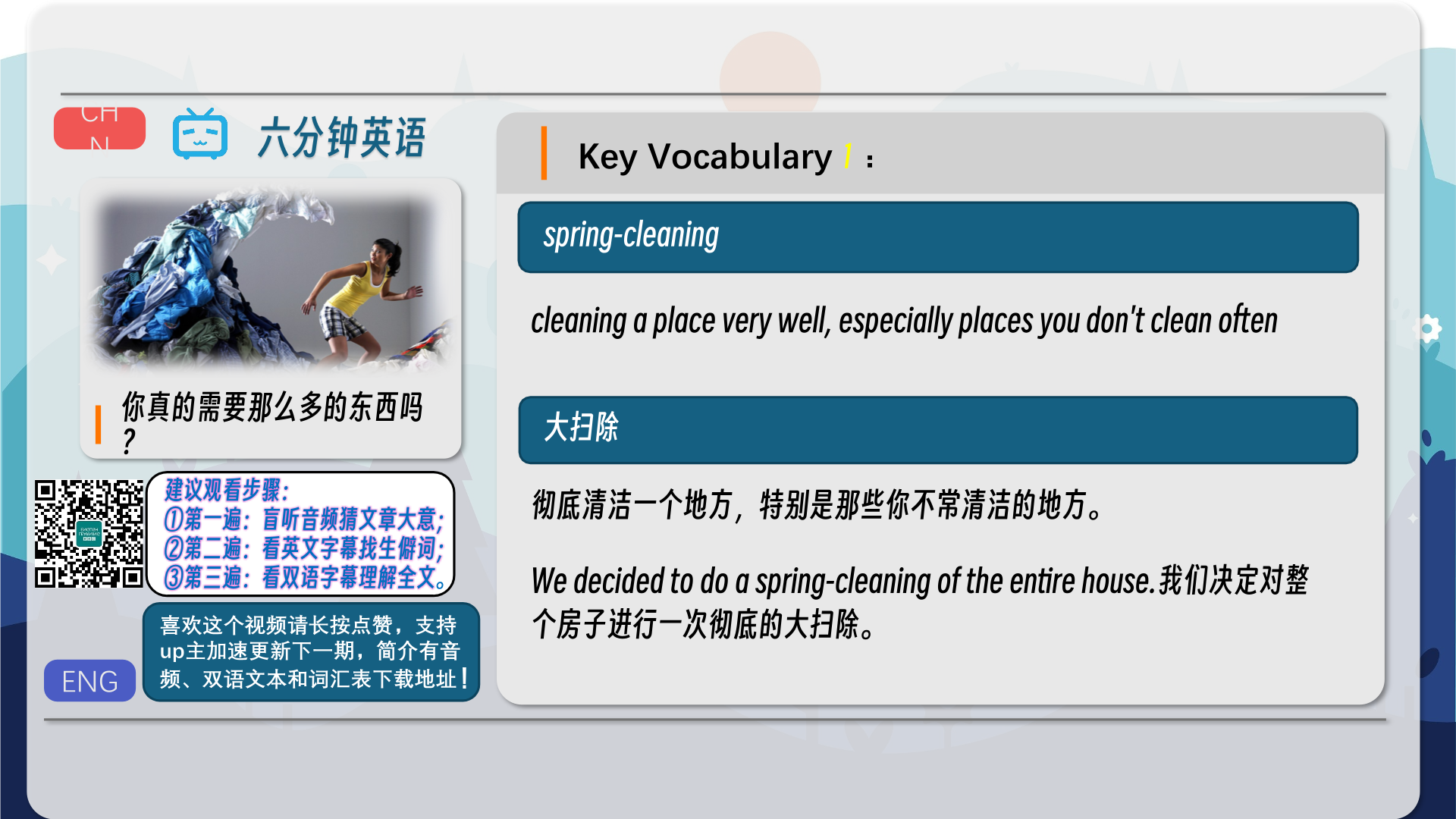
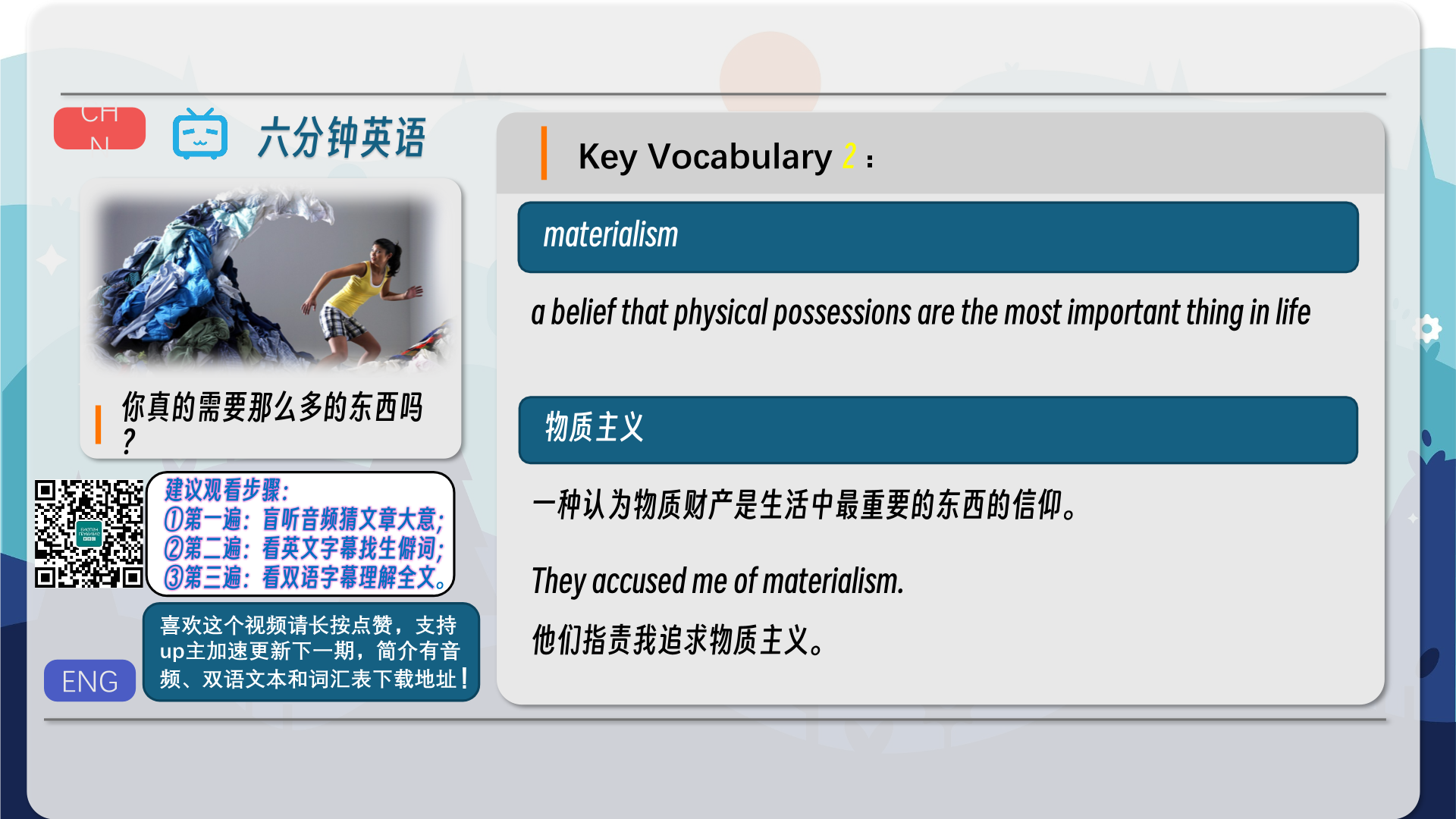
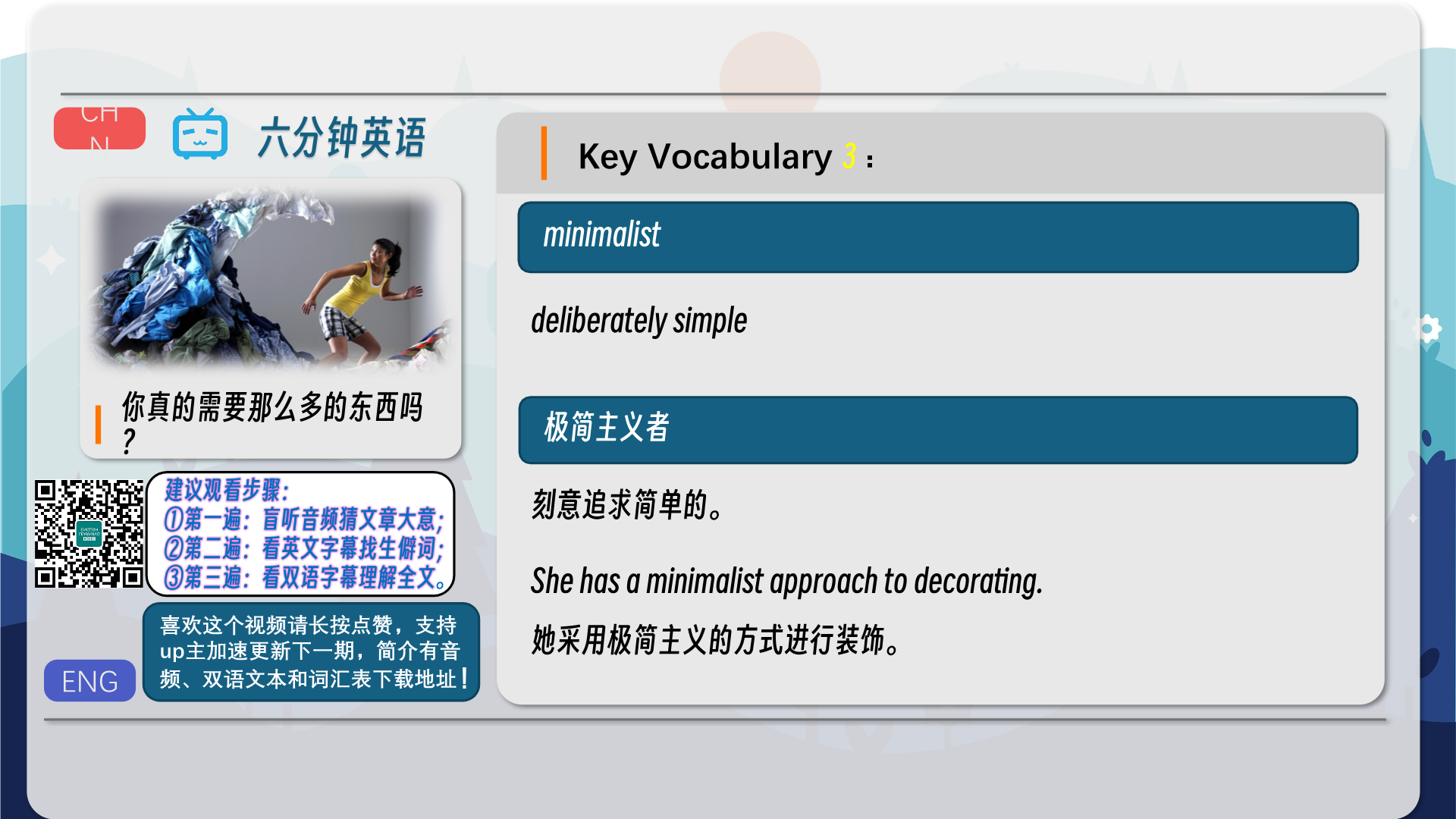
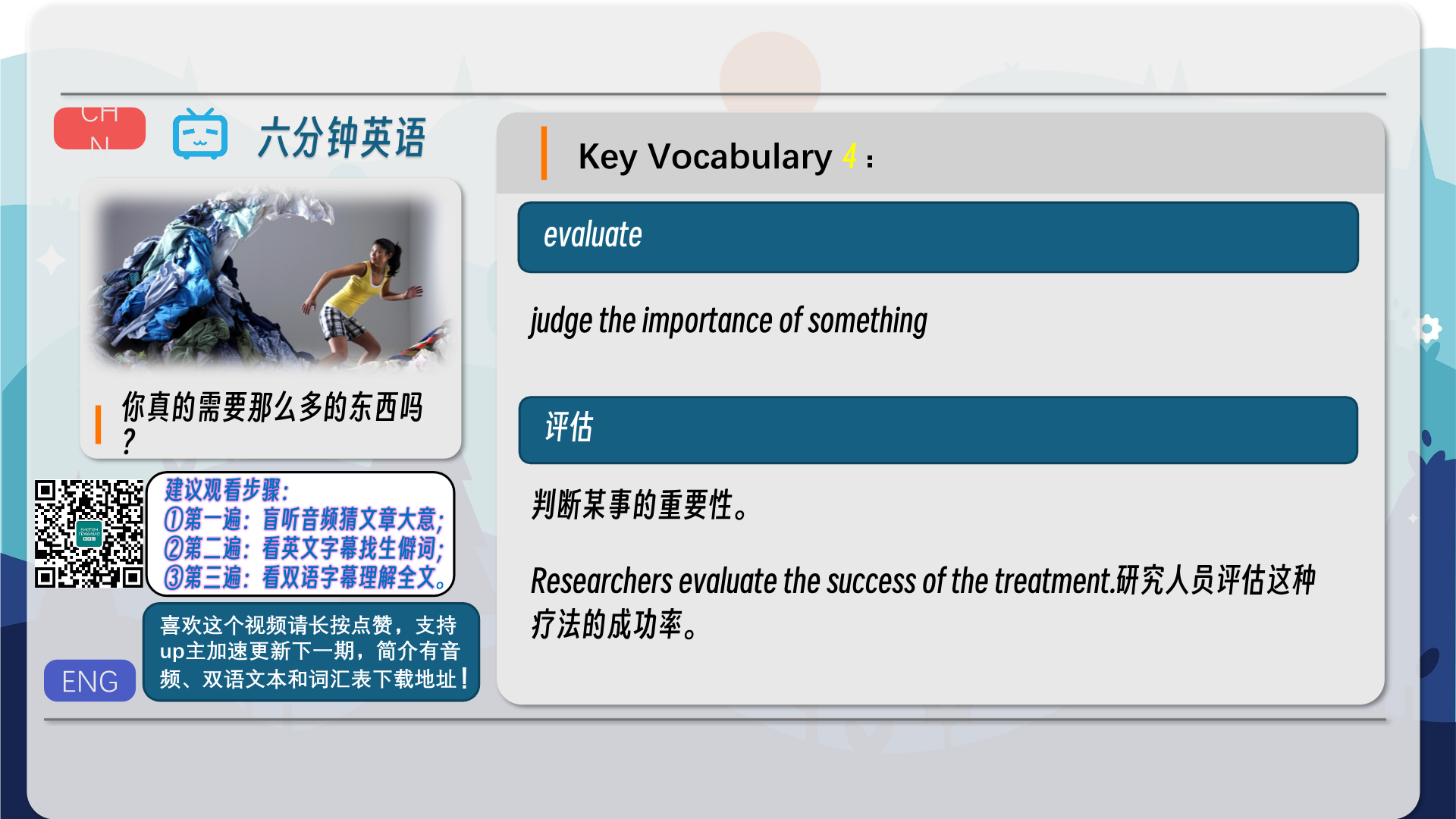
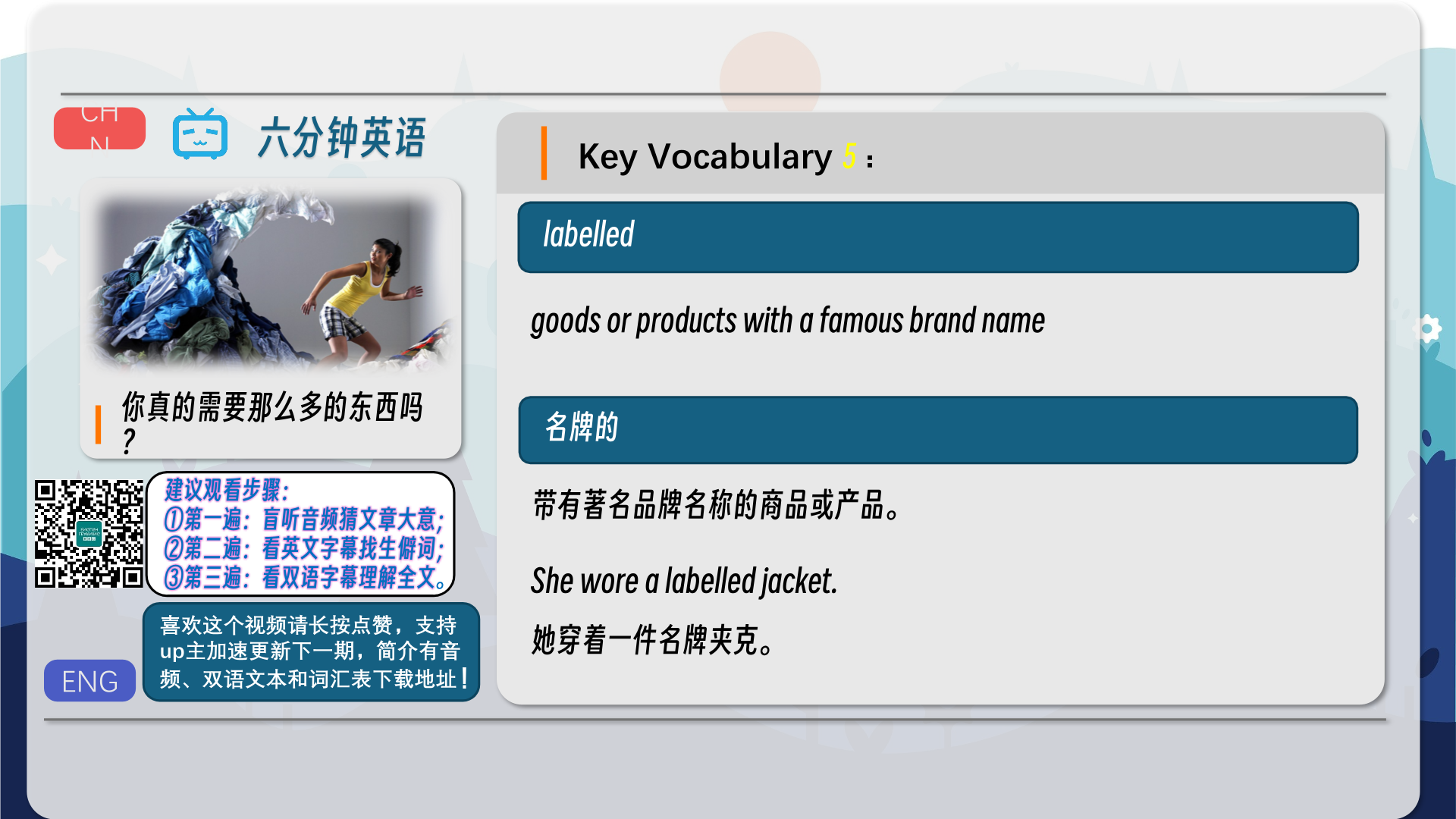
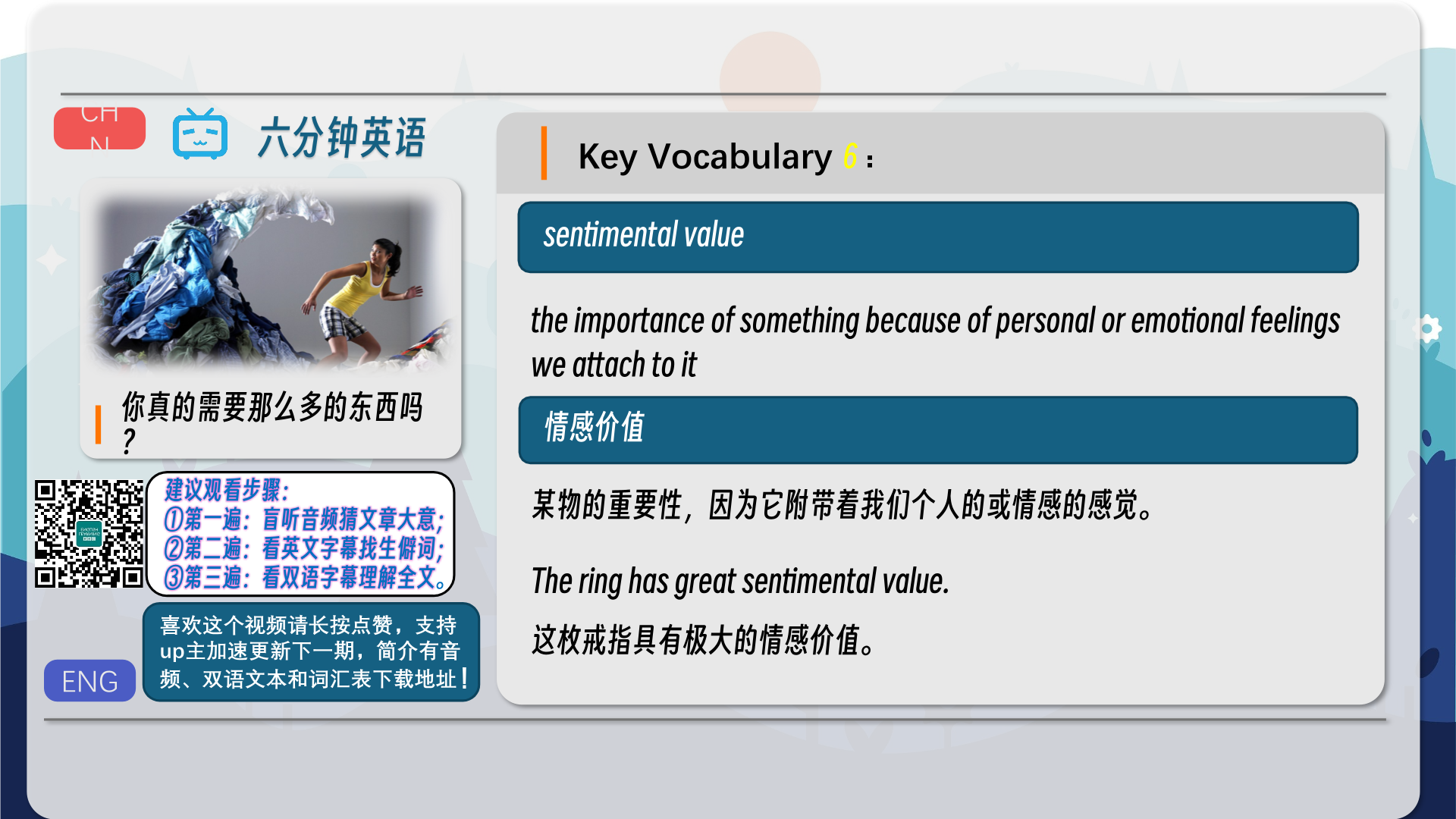
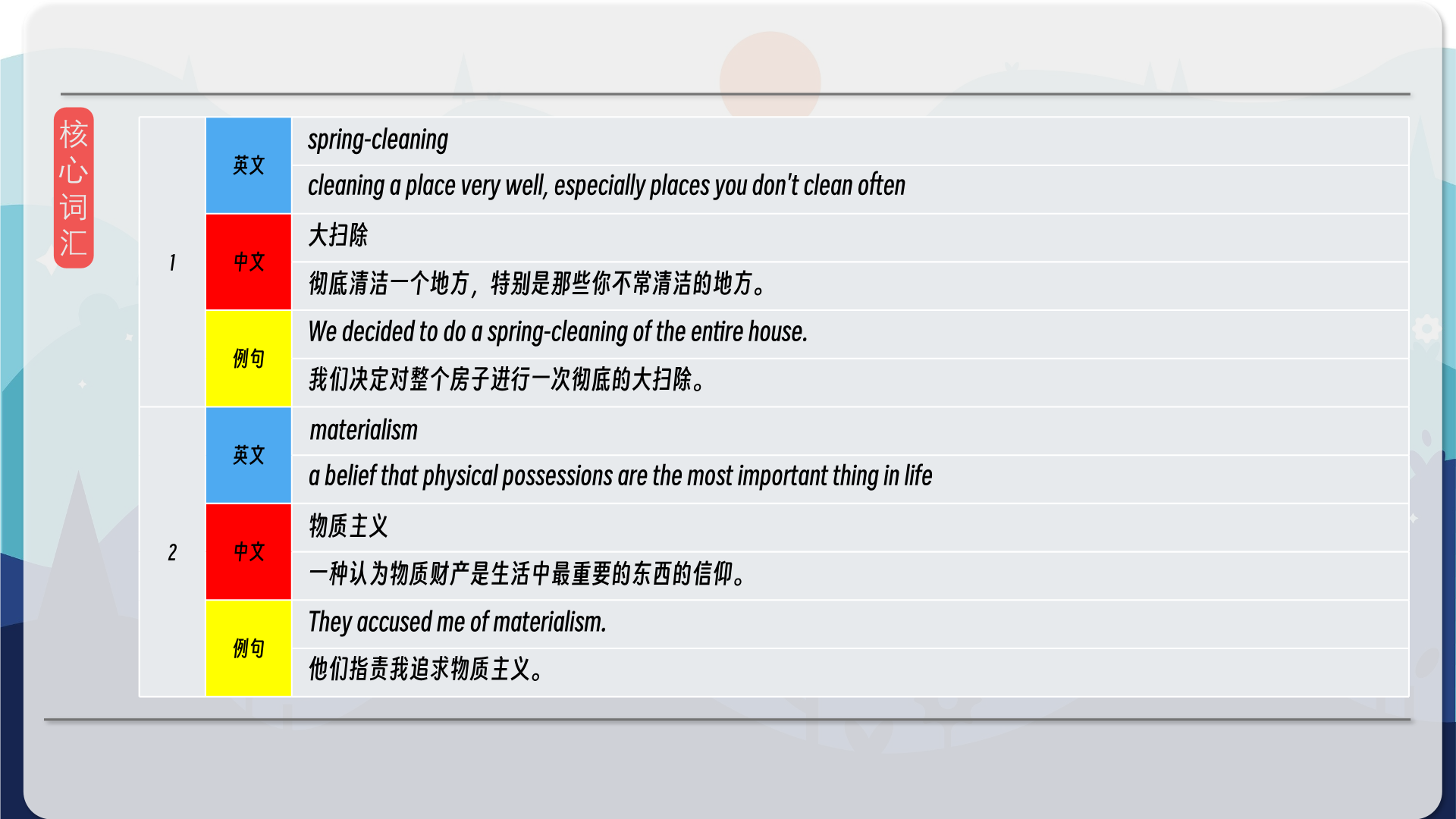
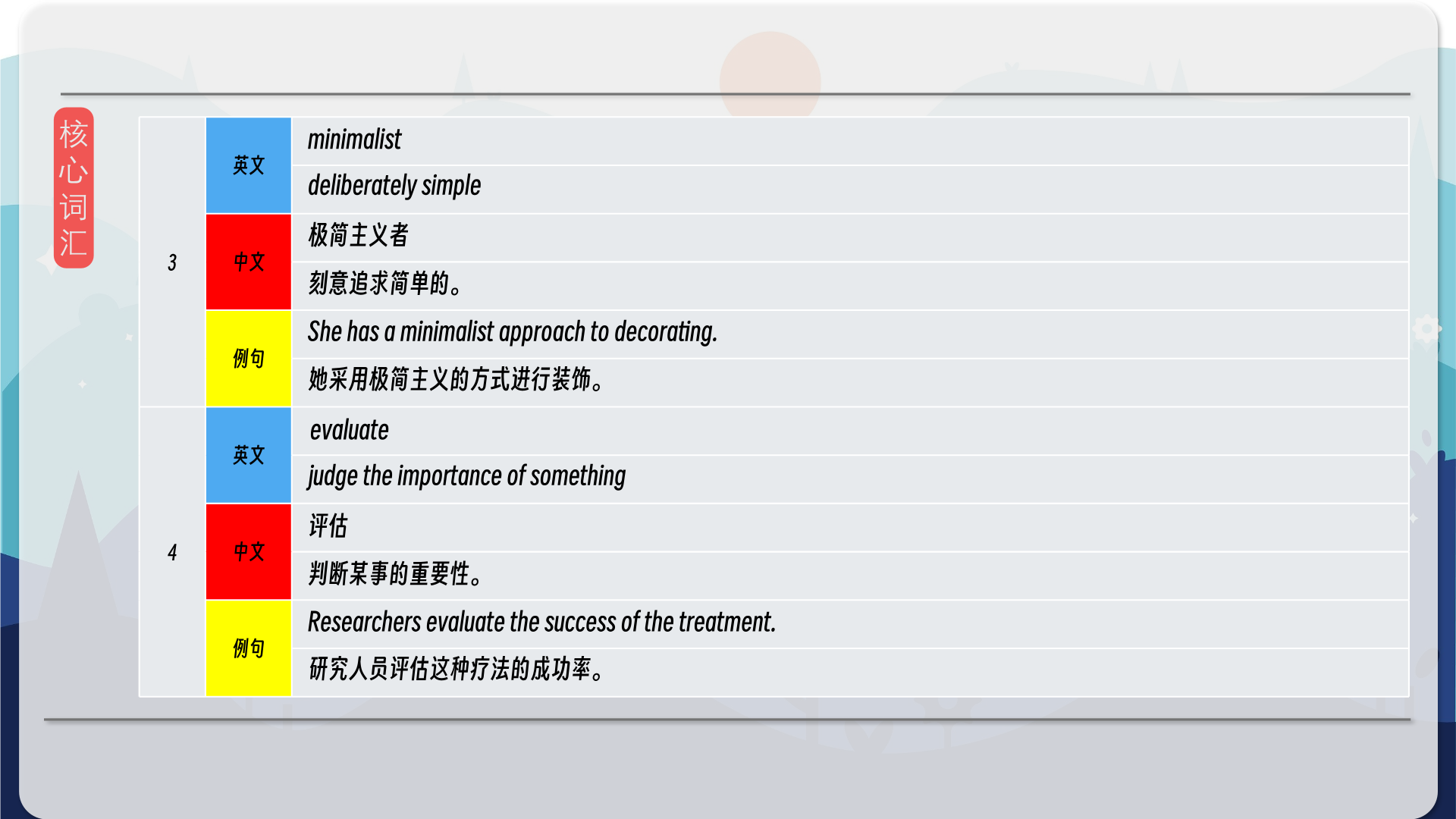
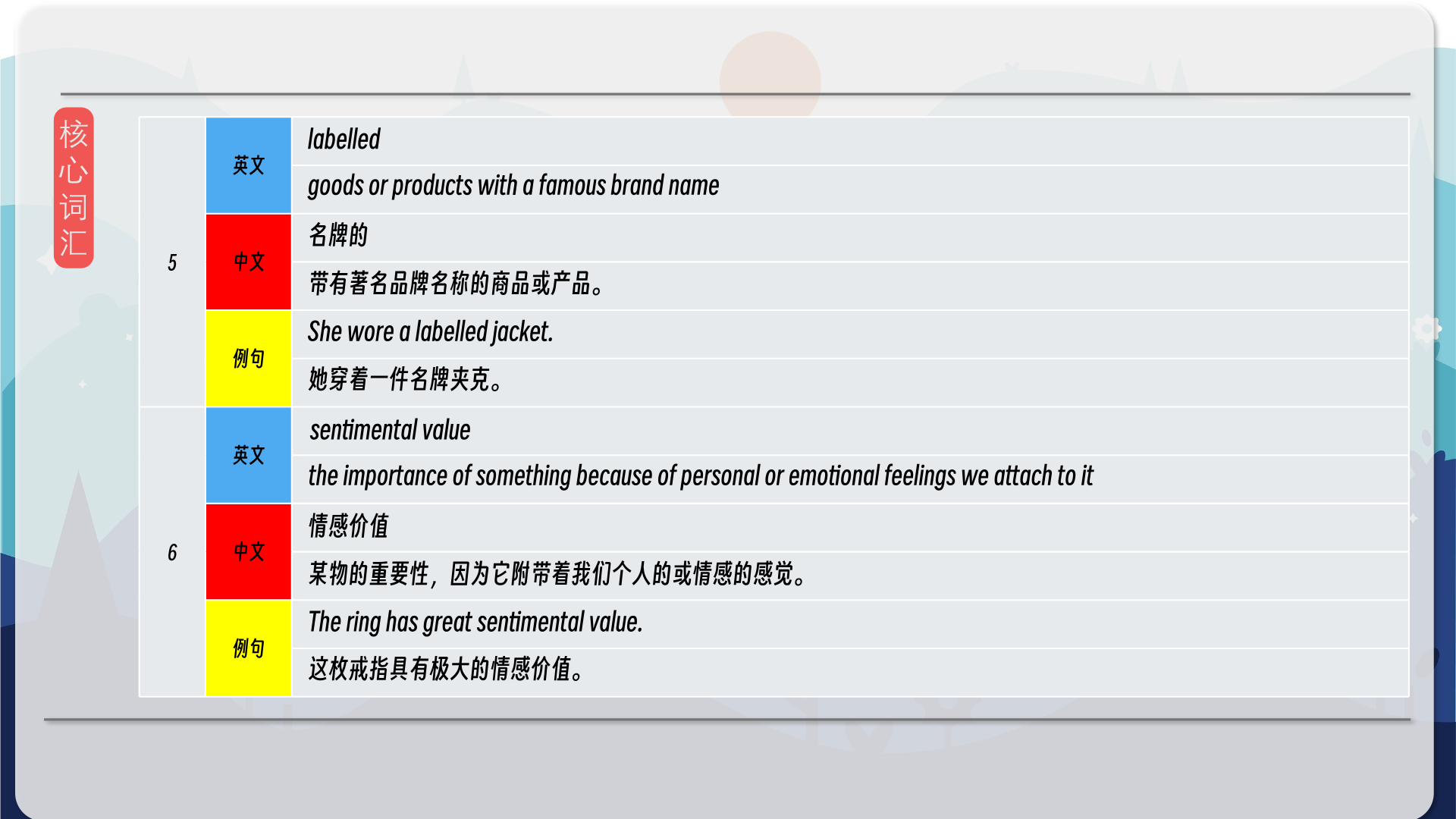
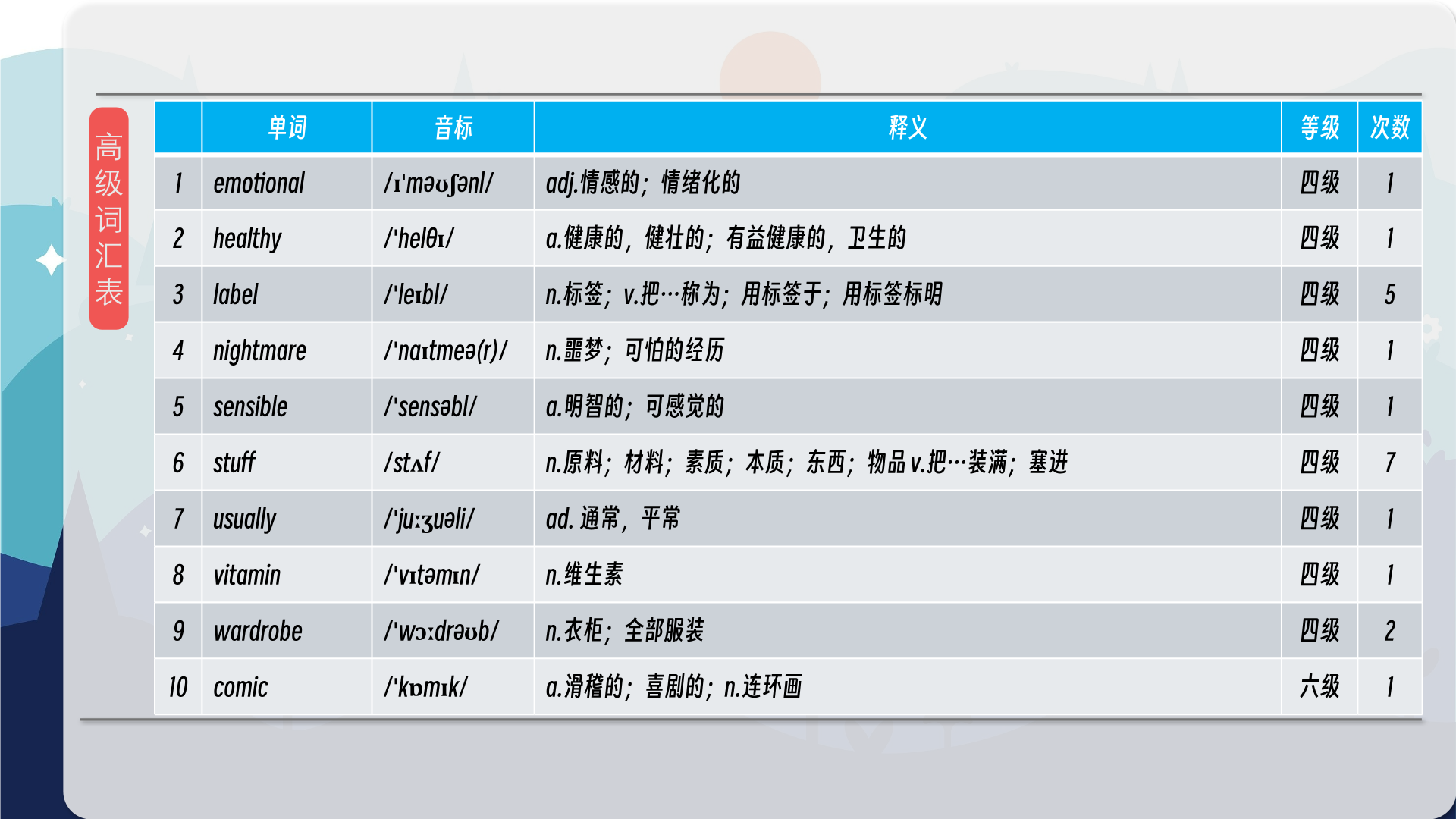

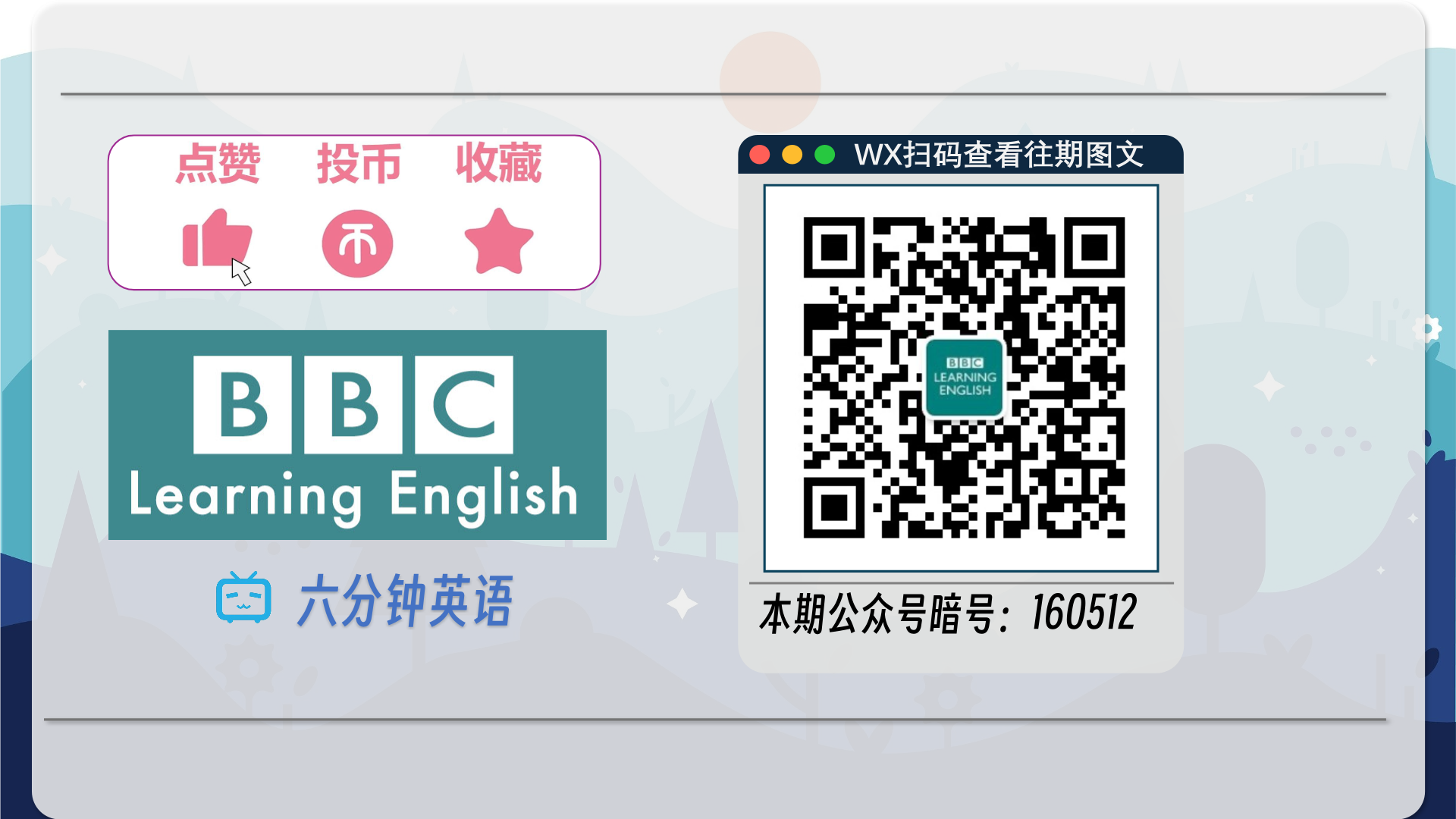
【核心词汇】
spring-cleaning
cleaning a place very well, especially places you don’t clean often
大扫除
彻底清洁一个地方,特别是那些你不常清洁的地方。
We decided to do a spring-cleaning of the entire house.
我们决定对整个房子进行一次彻底的大扫除。
materialism
a belief that physical possessions are the most important thing in life
物质主义
一种认为物质财产是生活中最重要的东西的信仰。
They accused me of materialism.
他们指责我追求物质主义。
minimalist
deliberately simple
极简主义者
刻意追求简单的。
She has a minimalist approach to decorating.
她采用极简主义的方式进行装饰。
evaluate
judge the importance of something
评估
判断某事的重要性。
Researchers evaluate the success of the treatment.
研究人员评估这种疗法的成功率。
labelled
goods or products with a famous brand name
名牌的
带有著名品牌名称的商品或产品。
She wore a labelled jacket.
她穿着一件名牌夹克。
sentimental value
the importance of something because of personal or emotional feelings we attach to it
情感价值
某物的重要性,因为它附带着我们个人的或情感的感觉。
The ring has great sentimental value.
这枚戒指具有极大的情感价值。
在公众号里输入6位数字,获取【对话音频、英文文本、中文翻译、核心词汇和高级词汇表】电子档,6位数字【暗号】在文章的最后一张图片,如【220728】,表示22年7月28日这一期。公众号没有的文章说明还没有制作相关资料。年度合集在B站【六分钟英语】工房获取,每年共计300+文档,感谢支持!